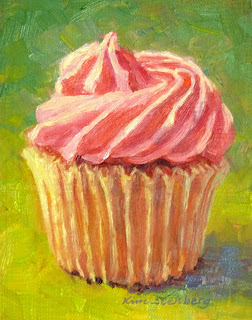Each week we will spotlight a different DPW artist who will give away one of their best paintings.
To enter to win Kim Stenberg's painting, "Morning After Snowfall," go to Daily Paintworksand click on the link at the top of the page announcing her interview.
From Kim's DPW Gallery page:
I received a PhD degree in British history at the University of Minnesota in 1993. Taking art classes turned out to be a life-changing decision and I have been using both sides of my brain ever since. I retired from teaching recently and now paint full time.
Tell us a bit about how you first started painting.
I had always admired people who could draw and paint. When I finally had leisure time after receiving my PhD, I checked out Betty Edwards's "Drawing on the Right Side of the Brain," tried all the exercises, and realized I could draw! I got hooked. I started taking art classes at The Art League School in Alexandria, VA in 1994. The rest is history.
Did you have any stops and starts in your painting career?
The only time when I didn't paint was when I had my daughter. For a year in 1999, I didn't paint. Obviously, it was tough for me to live without art! After years of hesitation and self doubt, I finally found courage to quit my job as a college professor in 2011. I now paint full time, living my dream.
What mediums and genres have you experimented with? Which ones have "stuck" and which ones have fallen away? Which ones are you looking forward to exploring?
I first started out with colored pencil, as it seemed the easiest. It was, however, too time-consuming. So I switched to watercolor, which many beginners choose somehow, thinking that it is easier than oil but isn't in reality. Anyhow I was successful as a watercolorist, received many awards, and was published in a book and magazines. Eventually, I fell like I hit the wall and decided to try acrylic, first on paper, then on canvas. My then art teacher told me that oil was easier than acrylic for the reason that the latter dries so fast that it makes blending difficult. So at a whim, I tried water-mixable oils about four years ago. That is when I found my true path! I am done exploring, although you never say never again. I have a brand new box of Holbein oil pastels lying around in my studio! One of these days....
Many of your paintings have this wonderful, sun-washed glow to them. How are you capturing such a beautiful, but elusive quality?
Oh, thanks. As so many artists say, we are in the business of painting light. I can't say honestly how I do it. I guess I go for a subject with a strong sense of light and try to capture it as best as I can. I learned that, in order to paint light, I have to paint rich, luminous darks and mid-tones. Does that make sense?
What does procrastination look like for you? What techniques work to ensure that you make time for your art?:
How do I dawdle? Suddenly I feel like cleaning my studio! If I paint everyday, or almost everyday, painting becomes a routine. Then I don't dawdle. Besides, it's now my job. I have to show up.
How do you generally arrive at ideas for your paintings?:
I usually work from photographs, although I go outside to paint when the weather is too good to stay inside. I have a stack of pictures--mostly landscapes and florals. I go though them from time to time and set aside a pile of let say 10 pictures. When I come to my studio, which is at home, I pick one from the pile. My decision depends partly on what kind of mood I am in and partly on how much time I have that day because some subjects require more time for drawing. I don't spend hours trying to figure out what to paint. This also answers the above question of how to avoid procrastination. When you know what to paint and are excited about it, you are less likely to procrastinate.
How do you keep art "fresh?" What techniques have helped you avoid burnout and keep your work vibrant and engaging?:
They say that you have to find your brand, your niche. That is a good advice, but I would also argue that one has to have several interests so that you don't get bored or burned out. I paint landscapes, architecture, florals, still lifes, animals, and occasionally figures. I paint en plein air, I paint from life, I paint from photographic references. I paint snow, I paint water; I paint tulips in the garden, I paint peonies in a vase; I paint birds, I paint dogs. I go back and forth. This way, I avoid boredom. Boredom would be the death of a daily painter!
What do you feel you are learning about right now as an artist?:
Last year I took a still life class for a year, which taught me a lot about composition and color mixing. Through my own experimentation last year, I learned to use more paint in my work. I continue to learn to mix better grays, mid-tones, and clean bright colors. As long as I live, I will be aspiring to become a better painter.
What makes you happiest about your art?:
Selling my paintings give me a momentary pleasure. But ultimately, the act of painting makes me happy. I recently came down with shingles over the holidays, which put me out of commission for a couple of weeks. When I started painting again, I still had lingering pain. But while I was painting, I didn't feel any pain. How about that!
Thanks, Kim!



























